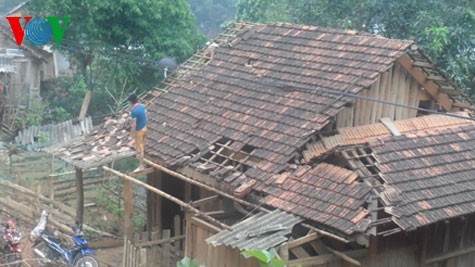(VOVworld) – The 7th Conference of the Party Central Committee has issued a resolution on “Actively dealing with climate change, enhancing natural resource management, and protecting the environment”. The resolution is an important guideline for sectors to implement appropriate measures.

Houses were damaged by a hailstone in Lao Cai province
|
Climate change is developing faster and more complicatedly than predicted in Vietnam. Annual reports show that natural calamities cause an economic loss of 1 to 1.5% of GDP. Vietnam has not properly exploited its natural resources and increasing environmental pollution will lead to potential ecological imbalance. One specific way to respond to climate change, manage natural resources, and protect the environment, according to the resolution of the Party Central Committee’s 7th Conference, is to step up communications to raise awareness and create a pro-active attitude about dealing with climate change, conserving resources, and protecting the environment. Nguyen Phu Trong, General Secretary of the Communist Party of Vietnam, spoke at the close of the Party Central Committee’s 7th Conference. “It’s essential to raise the awareness of Party members, the public, and the entire political system and make climate change response, resource management, and environmental protection key elements of sustainable national development. Environmental protection is a goal and a fundamental content of sustainable development, which needs to be integrated into the socio-economic development strategies and plans of each sector and locality.”
Communications about climate change response, effective use of resources, and environmental protection must instill a sense of pro-activeness in all sectors and at all levels. Vu Hong Khanh is Vice Chairman of the Hanoi People’s Committee. “At present, we have to focus communication activities on targeted groups, particularly schools. The schools will advocate climate change response, resource management, and environmental protection in extra-curricular activities and related information should be officially integrated into academic curriculum. Pupils have an overview of the topics so they can identify their responsibilities and get actively involved in protecting the environment and responding to climate change.”
It’s the responsibility of the State, enterprises, and the people, including scientists to study and apply scientific advancements to environmental protection, resource management, and response to climate change. Ngo Thuan Khiet, Deputy Head of the Environmental Science and Technology Department of the Vietnam Union of Science and Technology Associations, says it’s necessary to include these issues in legal documents to enlist the active involvement of scientists. Khiet said: “We have to change our direction, in particular to redirect investment into activities to deal with climate change, protect the environment, and conserve natural resources. This requires collaboration between the State, the private sector, and civil society. We haven’t had policies to mobilize the private sector’s involvement in this field.”
Party leader Nguyen Phu Trong pointed out that responding to climate change, managing resources, and protecting the environment should be associated with socio-economic development and government management. “The common tasks are to reform the growth model and the economy toward green growth and sustainable development, pilot green growth models in localities and sectors, and replicate the models nationwide. We have to rezone land according to ecological functions in order to build socio-economic development plans for sectors and localities that match regional ecological features”, Trong said.
According to the resolution of the Party Central Committee’s 7th Conference, by 2050 Vietnam will be a developed nation which must effectively deal with climate change, conserve natural resources, and achieve environmental standards equivalent to other industrialized nations in the region.